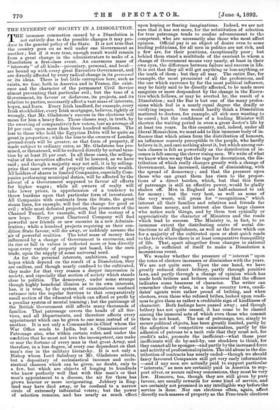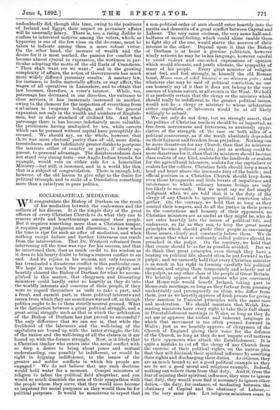THE INTEREST OF SOCIETY IN A DISSOLUTION.
THE immense commotion caused by a Dissolution is not entirely due to the possible changes it may pro- duce in the general policy of the State. It is not true that the country goes on as well under one Government as another; but if it were true, enough result would remain from a great change in the administrators to make of a Dissolution a first-class event. An enormous mass of " interests " of all kinds—pecuniary, personal, and local— are bound up with every great Executive Government, and are directly affected by every radical change in its personnel or its ideas. There is but little corruption here, such as exists, we fear, both in America and in France, the exist- ence and the character of the permanent Civil Service almost preventing that particular evil ; but the tone of a Government, its favour or disfavour, its projects, and its relation to parties, necessarily affect a vast mass of interests, hopes, and fears. Every Irish landlord, for example, every Irish stockholder, every Irish mortgagee, believes, rightly or wrongly, that Mr. Gladstone's success in the elections will mean for him a heavy fine. Those classes may, in truth, by the swerving of comparatively few voters, lose an average of 10 per cent. upon more than three hundred millions. The loss to those who hold the Egyptian Debts will be quite as greatin proportion ; while the loss to the owners of London ground-rents will be greater, as that form of property, if made subject to ordinary rates, as Mr. Gladstone has pro- mised, or threatened, will be reduced directly by actual taxa- tion by at least 25 per cent. In all these cases, the selling- value of the securities affected will be lowered, as we have said ; and though a majority may not sell, it is by selling- price that sane owners of property estimate their wealth. All holders of shares in limited Companies, especially Com- panies performing municipal duties, will be affected by the advent of a Government supposed to favour all efforts for higher wages ; while all owners of realty will take lower prices, in apprehension of a tendency to throw burdens upon that particular form of investment. All Companies with contracts from the State, the great steam lines, for example, will feel the change for good or evil ; while most defeated projectors, the promoters of the Channel Tunnel, for example, will feel the ecstasy of a new hope. Every great Chartered Company will find powerful new friends or new enemies in a new Adminis- tration; while a himdred projects requiring as their con- dition State favour, will die away, or suddenly assume the air of powerful realities. The total mass of money thus influenced by a change of Government is enormous, and its rise or fall in values is reflected more or less directly upon every variety of property not based, like the corn trade, upon the supply of some universal need. As for the personal interests, ambitions, and vague hopes which depend on the result of a Dissolution, they are endless, and though nearly confined to the cultivated, they make for that very reason a deeper impression in society, and especially that section of society which stands close to politics. The democracy, under some strange though highly beneficial illusion as to its own interests, has, it is true, by the system of examinations confined entrance into the regular Services to that comparatively small section of the educated which can afford or profit by a peculiar system of mental training ; but the patronage of the British Government still affects many thousands of families. That patronage covers the heads of all Ser- vices, and all Departments, and therefore affects every appointment which can be given to one man instead of to another. It is not only a Commander-in-Chief whom the War Office sends to India, but a Commissioner of Patronage also, who within certain rules, and under the condition that he must not love the incompetent, can make or mar the fortune of every man in that great Army, and therefore, in a less degree, of every one dependent on that man's rise in the military hierarchy. It is not only a Bishop whom Lord Salisbury or Mr. Gladstone selects, but a depositary of ecclesiastical incomes and eccle- siastical chances which can be given, no doubt, only to a few, but which are objects of longing to hundreds who know perfectly well that with this man's or that man's appointment to a diocese, the air for them has grown heavier or more invigorating. Jobbery in Eng- land may have died away, or be confined, to a narrow circle of extremely influential voters ; but the power of selection remains, and- has nearly as much effect upon hoping or fearing imaginations. Indeed, we are not sure that it has not more, for the substitution of selection for true patronage tends to confine advancement to the competent, who are necessarily also those who most affect opinion. Official pay is an object of desire even to some leading politicians, for all men in politics are not rich, and a few are, for their positions, exceptionally poor ; but behind them stand a multitude of the esurient to whom a change of Government means very nearly, at least in their own eyes, the difference between failure and success in life. It is not that they all will get anything or lose anything, or the tenth of them ; but they all may. The entire Bar, for example, the most prominent of all the professions, and the one which exercises by far the most political influence, may be fairly said to be directly affected, to be made more sanguine or more despondent by the change in the Execu- tive which follows, or may be averted by, the result of a Dissolution ; and the Bar is but one of the many profes- sions which feel in a nearly equal degree the deadly or vivifying impact. One would hardly think a Dissolution mattered to doctors, for example, all sick men wanting to be cured ; but the confidence of a leading Minister will shorten the waiting period in even a great doctor's life by at least ten years. In this country, and, indeed, under all liberal Monarchies, we must add to this immense body of in- fluence that which arises from the distribution of honours, an influence scarcely perceptible to the people, who hardly believe in it, and care nothing about it, but which among cer- tain classes is felt as powerfully as the distribution of in- comes is felt among the clever rising men. We write of what we know when we say that the rage for decorations, the dis- tribution of which really changes greatly with a change of Government, has increased, instead of diminishing, with the spread of democracy ; and that the pressure upon those who can grant them has risen to the propor- tions of a direct burden, which, but that this form of patronage is still an effective power, would be gladly shaken off. Men in England are half-ashamed to ask for money ; but the very best, as well as some of the very worst, will press for "recognitions," which interest all their families and relatives and friends far more than money, and interest also those large classes who notice such things, and by them test cynically or appreciatively the character of Ministers and the roads which lead to success. The Ministry is, in fact, to an immense extent the distributing centre of social dis- tinctions to all Englishmen, as well as the force which can for a majority of the cultivated open or shut quick roads to the levels where there is at least comparative tranquillity of life. That, apart altogether from changes in national policy, is sufficient of itself to make a Dissolution a momentous event.
We wonder whether the pressure of " interest " upon the votes of electors increases or diminishes with the years. We are not quite sure. 'Upon the one hand, we have greatly reduced direct bribery, partly through punitive laws, and partly through a change of opinion which has made both bribers and bribees conscious that the offence indicates some baseness of character. The writer can remember clearly when, in a large country town, candi- dates' agents were rather proud of bribing, and when electors, even those who refused bribes, looked upon readi- ness to give them as rather a creditable sign of kindliness of character. Both feelings have passed away ; and though bribery has not quite ceased, it has come to be classed among the immoral acts of which even those who commit them do not boast. The use of patronage, too, simply to secure political objects, has been greatly limited, partly by the adoption of competitive examination, partly by the adhesion of patrons to a tacit rule that they must not, for credit's sake, promote the inefficient—what those poor inefficients will do by-and-by, one shudders to think, for they cannot all be sponges—and partly by the increased force and activity of professionalopinion. The old abuse in the dis- tribution of contracts has nearly ended—though we should fancy favoured Companies still get very early information —and if any men are actually paid to support particular "interests," as men are certainly paid in America to sup- port silver, or secure railway concessions, they must be very few. Honours, too, though they are still given by pure favour, are usually rewards for some kind of service, and are certainly not promised in any intelligible way before the service is done. Nor can elections often, again, affect directly such masses of property as the Free-trade elections undoubtedly did, though this time, owing to the positions of Ireland and Egypt, their impact on pecuniary affairs will be unusually heavy. There is, too, a rising dislike to confess to interested motives among the voters, which, as hypocrisy is one of the few vices on the decrease, must be taken to indicate among them a more robust virtue. On the other hand, the increase of wealth and the desire for it is most marked, the passion for comfort has become almost cynical in expression, the workmen in par- ticular adopting the motto of the old Earls of Cmnstoun, "Thou shalt want ere we want ;" and in the growing complexity of affairs, the action of Governments has much more widely diffused pecuniary results. A sanitary law, for instance, in India materially affects, or may affect, the wages of all operatives in Lancashire, and to obtain that law becomes, therefore, a voter's interest. While, too, patronage has decreased in one direction, the entrance to close services, it has immensely increased in another, owing to the clamour for the inspection of everything from c Al-mines to twopenny lodgings, and to the general expansion, not only in the wealth and numbers of English- men, but in their standard of civilised life. And what patronage there is has become indefinitely more valuable, the petitioners having multiplied by ten, while careers which can be pursued without capital have perceptibly de- creased. We should say, on the whole, however, that tInre was more electoral purity than of old, more disin- terestedness, and an indefinitely greater dislike to postpone the interests either of country or party, if clearly ap- parent, to personal advantage. The disinterestedness does not stand very strong tests—our Anglo-Indian friends, for example, would vote on either side for a bimetallist Ministry—but still, it increases, and in a world like this, that is a subject of congratulation. There is enough left, however, of the old leaven to give edge to the desire for political triumph, and to make of a Dissolution something more than a cataclysm in pure politics.



































 Previous page
Previous page